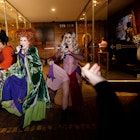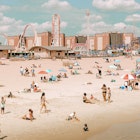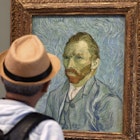
NYC's new Basquiat exhibit features 177 previously unseen works

Apr 21, 2022 • 5 min read

A guest takes in the exhibition at the "Jean-Michel Basquiat: King Pleasure" opening party with Bombay Sapphire in NYC © Madison McGaw
In the past half-century, few artists have captured the public imagination quite like Jean-Michel Basquiat – and now the one-of-a-kind artist has inspired a one-of-a-kind exhibition in New York City.
Opened earlier in April at the historic Starrett-Lehigh building in West Chelsea, Jean-Michel Basquiat: King Pleasure features more than 200 works and artifacts, nearly 90% of which have never been shown publicly until now. But more than just the array of previously unseen material, the exhibit – curated by his sisters – aims to put the artist’s work in the context of his life as a whole.

“One narrative we want to clear up is that Jean had a family. He wasn’t just plopped into whatever story people create for him,” middle sibling Lisane Basquiat told the UK’s Times.
Though it’s a grand endeavor, set in a sprawling 12,000-sq-ft space designed by architect Sir David Adjaye (responsible for Washington, DC’s National Museum of African American History and Culture, among others), King Pleasure creates an intimate portrayal of a figure who’s become larger than life in modern times.
“We see it as a personal account, and a personal account of Jean-Michel’s journey and life. We see this as our response to all of the people who reach out to us all the time, asking about Jean-Michel and wanting more of Jean-Michel,” Lisane Basquiat told ARTnews.
“We didn’t want it to be a scholarly show. We didn’t want it to be a museum or gallery show. We really wanted it to be an experience,” added her sister, Jeanine Heriveaux. “One that you felt showed Jean-Michel as a man, as a brother, as a son, as a nephew, as a grandson – that was our main goal and the experience that we wanted you to feel as soon as you stepped inside and are immersed in his lifetime.”

Positioning ephemera such as the artist’s birth announcement and Brooklyn Museum junior membership card alongside family photos, early sketches, and the last piece he ever created, the exhibition is divided into multiple themed “environments.” Each section is dedicated to a different time period, from his birth in 1960 to his childhood years in Brooklyn to the wild heights of his ‘80s-era fame to his death from a heroin overdose a few years later, culminating in an examination of Basquiat’s legacy (and a very well-stocked gift shop).
“The conventional museum exhibition tends to isolate the artwork from real life and they did just the opposite,” dealer Jeffrey Deitch told the New York Times. “The life story of Jean-Michel and the family story are totally integrated with the presentation of the artworks, and it gives you such deeper insight into how the work was created, how it was inspired… It’s not a professional academic presentation, but that’s what’s so fresh.”

Soundtracked by Spotify with separate playlists for each environment, the exhibit touches on all aspects of Basquiat’s life. Globetrotters might find the portrayal of his relationship with travel particularly interesting – his 1986 passport is even on display.
“Travel was an integral part of Jean-Michel’s life. Besides needing to travel for his exhibitions around the world, he also had a love for different cuisines and cultures,” Jeanine Heriveaux wrote in the show's accompany catalog. “The two places that I know were life-changing for him were Hawaii and Abidjan, capital of the Ivory Coast in Africa. He loved Hawaii – Maui in particular. He felt at peace and free there, and the tranquility allowed him the opportunity to reset.”

According to a New York Times article published shortly after his death, those trips to Hawaii were specifically to cut back on his drug use. “He said, ‘I gotta get out of New York; I hate it,’” the artist’s onetime bandmate Vincent Gallo said in an interview. “‘He was going to Hawaii. He said, ‘There's no heroin there, and it's so beautiful you don't even think about it.’”
Taking its name from a Basquiat painting, which in turn took its name from a 1950s jazz vocalist whose first hit was on heavy rotation in the family home, King Pleasure doesn’t delve much into those darker sides of the artist’s story. Rather, his family opted for a more holistic approach.

“This really was a labor of love and a walk for us through our own journey with Jean-Michel and our lives as three people coming into the Basquiat family,” Lisane told ARTnews. “This was not a handoff to someone else to do. We personally decided every single thing that’s in here. These are works that haven’t been seen in decades. We’re not curators – we’re his sisters, we’re his family, and every work is ours, in our collection.”
Though eyebrows have been raised about the exhibition’s price tag – adult tickets currently go for $35 on weekdays, $45 on weekends, and $65 to skip the line – its organizers say the experience is one that’s completely unique. “This is not a commercial project at all,” Lisane explained on the Wall Street Journal’s podcast The Journal. “We wanted to show people who appreciate his work more of his work. And to give them a perspective that they can't get anywhere else. This is a story that only we can tell.”
You might also like:
From Kanye to Louis Vuitton: an exhibition devoted to designer Virgil Abloh is coming to NYC
Black Gotham walking tours will lead you through New York's untold history
Support Black-owned businesses on your next trip with this new app
Explore related stories



 Art and CultureHere's how to visit the Metropolitan Museum of Art in 1, 3 or 8 hours
Art and CultureHere's how to visit the Metropolitan Museum of Art in 1, 3 or 8 hoursSep 18, 2025 • 9 min read






